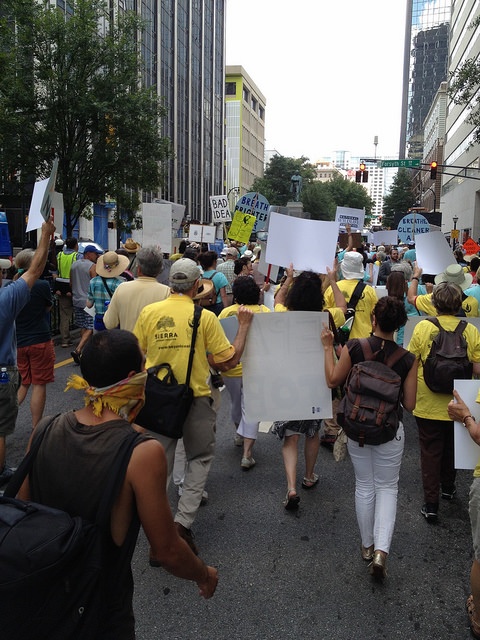Big Carbon vs. the future at EPA Clean Power Plan hearings

This week the Environmental Protection Agency held a series of public hearings in Atlanta and three other cities on its proposed rule to cut emissions of carbon and other pollution from power plants.
The hearings offered ringside seats for the political fight underway between supporters and opponents of the Clean Power Plan, which aims to offer states a flexible approach to reducing carbon emissions by 30 percent below 2005 levels by 2030. Power plants are the single biggest source of carbon pollution in the U.S., and Southern states disproportionately contribute to the problem due to their dependency on coal power.
The hearings kicked off Tuesday in Atlanta, Denver, and Washington, D.C. and on Wednesday in Pittsburgh. Originally set to last one day, they were extended to two because of the overwhelming number of requests to speak. In all, about 1,600 people signed up to testify, though there were still complaints about the scarcity of speaking slots from groups opposed to the rule.
Outside the Atlanta hearing, activists on both sides of the rule rallied in the streets. Americans for Prosperity, a conservative group founded by the billionaire brothers behind the Koch Industries oil and chemical conglomerate, held a sparsely attended rally. Meanwhile, the industry-backed Consumer Energy Alliance held a press conference against proposal with speakers including Alabama AFL-CIO President Al Henley, who said that forcing coal plants to close would eliminate "middle-class jobs in the poverty-ridden South." The United Mine Workers of America union also plans a big rally against the proposal on Thursday in Pittsburgh, with about 70 busloads of miners expected to come from as far away as Alabama.
On the other side, about 1,000 people attended a lively rally and march through Atanta's streets in support of the rule. Among the speakers were the Rev. Gerald Durley, pastor emeritus of Providence Missionary Baptist Church in Atlanta and a longtime civil rights activist who views climate change as a civil rights issue. Mary Ann Hitt, the West Virginia-based director of the Sierra Club's Beyond Coal campaign, called for expanding solar and wind power to "create jobs, lower power prices and clean up our air."
Inside the Atlanta hearing room, EPA representatives heard from people representing a range of groups. Two members of the Georgia Public Service Commission (PSC) testified against the rule, saying said the proposal would force Georgia Power to abandon coal plants where it's installing more effective pollution controls. PSC chair Chuck Eaton said the rule "would effectively require a redesign of the state's energy plan without regard to cost."
Among those testifying in favor of the rule were clean energy expert Greg Andeck of the Environmental Defense Fund's North Carolina offices and several staff members of the Tennessee-based Southern Alliance for Clean Energy. SACE Executive Director Dr. Stephen Smith said his scientific background as a veterinarian and systems theorist prepared him to understand the complex and rapidly changing science of climate change but that wasn't his main reason for testifying.
"My primary motivation is that I'm a father of three sons, and I have two grown sons," Smith said. "It is in my role as a father and a grandfather that I worry the most about what kind of world we will leave for our children."
Smith noted that, as someone in his 50s, he was "blessed" to live in a world with a stable climate and to have benefitted from the actions of previous generations that had used the best science available to successfully tackle serious disease threats. But he said he fears that his generation is not similarly committed to a better future for their children, despite having cost-effective low- or no-carbon alternatives available.
"What is blocking our fulfillment of this intergenerational bond of a better world?" Smith asked. "It is simply those who have a financial interest in current high-carbon pollution investments."
You can watch his five-minute testimony here:
The EPA will be accepting feedback on the clean power proposal through Oct. 16. For details on how to submit comments, click here.
Tags
Sue Sturgis
Sue is the former editorial director of Facing South and the Institute for Southern Studies.
